| |
September 28, 2004
Two at the Top 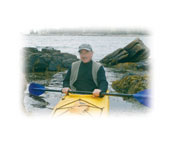 The Chronicle of Higher Education calls Roger W. Bowen ’69 (left) “a force of nature” who earned the 1998 Meiklejohn Award for his defense of academic freedom during a controversy at the State University of New York at New Paltz. The Chronicle of Higher Education calls Roger W. Bowen ’69 (left) “a force of nature” who earned the 1998 Meiklejohn Award for his defense of academic freedom during a controversy at the State University of New York at New Paltz.
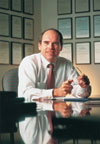 John Bachmann ’60 (right) transformed a regional financial services business into what Fortune magazine called “the Wal-Mart of Wall Street,” and his management of Edward Jones is the subject of a case study at the Harvard Business School. John Bachmann ’60 (right) transformed a regional financial services business into what Fortune magazine called “the Wal-Mart of Wall Street,” and his management of Edward Jones is the subject of a case study at the Harvard Business School.
Now both men are at the reins of organizations that represent their respective vocations.
Bowen took over in July as General Secretary of the 44,000-member American Association of University Professors.
Bachmann was named Chairman of the Board of Directors of the United States Chamber of Commerce—the world’s largest business federation, representing more than three million businesses—for 2004–2005.
In addition to increasing the membership and continuing to fight against the exploitation of part-time faculty members, Bowen says he wants to monitor what he sees as the politicization of higher education and the threats to academic freedom since the September 11 attacks, The Chronicle reports. He wants the AAUP to broaden its mission to include academic groups throughout the world.
Bachmann says he will focus on four critical business issues during his term: tort reform, greater access to health care, the benefits of trade and global sourcing, and reform of the retirement system.
“Given demographic changes, our retirement system is unsustainable,” Bachmann says. “If it acts now, America has an opportunity to avoid what’s currently happening in parts of Europe—retirement benefits being cut.”
With Wabash grads leading these organizations, we might add another item to the agenda—a conversation on what business and academia can learn from each other.
In that spirit, the College this summer began its “immersion in business” course for Wabash students. Read more about the course, and about the College’s Lilly Endowment Initiative to Promote Opportunity through Small Educational Collaborations, at WM Online.
Generations Join Voices
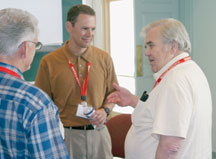 | | Professor Joe O'Rourke talks with Dave Callecod '89 after the "Challenges in Health Care" session at this year's Big Bash.
| | “This has been wonderful,” Dr. Robert McVicker ’69, a Columbus, Ohio heart surgeon told alumni and faculty gathered in Baxter Hall for a discussion of the “Challenges in Today’s Health Care.”
He’d just heard Marion General Hospital CEO Dave Callecod ’89, pharmaceutical entrepreneur Art Morelli ’69, and Dr. Jack Sipe ’64, neuroscientist and senior consultant at the Scripps Clinic and Research Institute, candidly describe the alarming struggles facing health care providers and patients in the coming decade.
“I’m so glad we’re discussing these issues, and I’m sitting here with so many questions I’d like to ask, that I’m not sure where to start.”
As McVicker described spiraling malpractice insurance costs in Ohio and lauded Indiana’s limits on malpractice lawsuits, a hand went up in the back of the room. Dr. John Pantzer ’54, who decades ago helped Indiana Governor Otis Bowen establish those guidelines, described the process and rationale behind them.
It was an engaging, even fervent discussion from a helpful range of perspectives and a remarkable depth of expertise and experience.
A similar convergence occurred during the session on “Community Service,” when Volunteers in Medicine co-founder Dr. Sherm Franz ’59 introduced Joe Higgs ’79, who spoke about his neighborhood advocacy work in Houston, Texas, then answered a question from Bob Wedgeworth ’59, president of Proliteracy Worldwide, the world’s largest literacy training and advocacy organization. Joining in the discussion after the session was Clay Robbins ’79, president of Lilly Endowment Inc.
There are times when the reach of this College seems outrageously disproportionate to a school of 850 students, and the first annual Big Bash at Wabash Reunion Weekend was one of them.
And the voices of all 10 reunioning classes singing Old Wabash on the Chapel steps created a moving, even joyous, Wabash moment.
"We are your sons...." 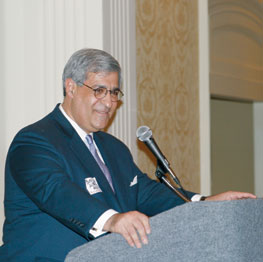 “As you look at the people in this room, you know that they are more than former students and brothers of Lambda Chi,” master of ceremonies Butch Alberico ’70 told Professor John Fischer H’70 as the brothers of Lambda Chi Alpha paid tribute to the esteemed professor of classics and their longtime advisor. “As you look at the people in this room, you know that they are more than former students and brothers of Lambda Chi,” master of ceremonies Butch Alberico ’70 told Professor John Fischer H’70 as the brothers of Lambda Chi Alpha paid tribute to the esteemed professor of classics and their longtime advisor.
“Being your student was the beginning of a relationship that has shaped and enriched my life like few others, and many here will say the same,” Alberico added. “We are not your former students; we are your sons.”
Sharing a Passion for Theater 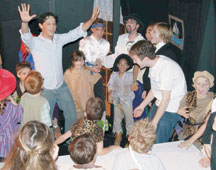 | | Pacheco and the actors of "Peter Pan" warm up for dress rehearsal.
| | Wabash junior Reynaldo Pacheco has performed in his home country of Bolivia in national productions of “Cats,” “Oliver,” and “Joseph and the Amazing Technicolor Dreamcoat.”
He sang and played the part of Pontius Pilate in Filharmonic de La Paz’s production of “Jesus Christ Superstar.”
He has also performed in productions at Wabash; his thought-provoking play, “The Doll,” was staged here last fall, and he was invited to audition for the Juilliard Conservatory before he came to Wabash.
So why did he agree to direct 44 young actors, ages 4 to 19, in a relatively small-scale production—albeit an unusually energetic and imaginative one—of “Peter Pan” for the local Sugar Creek Players?
Pacheco is surprised by the question.
“You always learn new things when you direct, and these people are very open to new ideas, to creating something fresh,” he says. “It’s been a great experience for me—it’s always great to do theater like this.”
Pacheco says many of his most important lessons in theater have come from small ensembles.
“I was in theater with gypsies in Bolivia, and we performed where ever we could,” he recalls. “We didn’t have a building or many costumes—we had a mat we’d lay over the floor to keep from getting splinters. But I learned more about practical theater there than anyplace else. They are so passionate; they do this because they love it.”
Pacheco, whose first English-language play was performed at the high school in Brilliant, Ohio, where he was an exchange student four years ago, hopes to stage and act in more of his plays here in the future.
But following the “Peter Pan” performance, he jetted off to Chiapas, Mexico to work for a second summer with the Indigenous Theater Project founded by Smithsonian scholar Robert Laughlin and supported by Nancy and Dave Orr ’57. We’ll include an essay by Pacheco about that experience in the next edition of WM.
The Allure of a Goddess 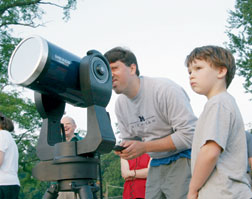 | | Associate Professor of Physics Jim Brown aligns the scope under the watchful eye of Henry Swift, son of Wabash archivist Beth Swift and grandson of Professor Emeritus of Mathematics Bill Swift h'67, who with his wife, Ellen also turned out for the viewing. | | Never underestimate the seductive powers of Venus.
About two-dozen staff members, young people, community friends, and faculty (the religion and philosophy department was mysteriously well-represented) woke up at 4:30 a.m. and straggled out to the parking lot behind Little Giant Stadium to view the transit of Venus across the sun.
As any of you who viewed the phenomenon know, only six transits of Venus have occurred since the invention of the telescope. Thanks to Assistant Professor of Physics Jim Brown, we viewed this one through one of the College’s two new telescopes, an 8” Meade Schmidt-Cassegrain, appropriately filtered.
More on the physics department’s new curriculum and digs in the renovated Goodrich Hall in the next WM.
"Work from the Heart"  Dr. Frank Fish ’79 is associate professor of pediatrics & medicine at Vanderbilt University Medical Center, specializing in pediatric electro-physiology and in treating young people with all types of heart disease. But what the thousands of people who heard his “Day in the Work Life” segment on public radio’s “Sound Money” know about Frank Fish is that he’s a doctor whose “patients are children and whose work comes from the heart.” Dr. Frank Fish ’79 is associate professor of pediatrics & medicine at Vanderbilt University Medical Center, specializing in pediatric electro-physiology and in treating young people with all types of heart disease. But what the thousands of people who heard his “Day in the Work Life” segment on public radio’s “Sound Money” know about Frank Fish is that he’s a doctor whose “patients are children and whose work comes from the heart.”
“I’m at the point in my career where I enjoy the challenging cases,” Fish says. “But sometimes it’s difficult, particularly when you’ve gotten to know a child well as a person; sometimes the child reminds you of your own children, or the family has more than one child with this difficult heart condition, and you realize how lucky you are.
“Anyone in medicine will tell you that there’s nothing harder than talking with a family who has lost a child. It’s never something you get used to—it hurts every time.”
Fish concludes: “My work with teenagers has evolved into a deep respect and affinity for adolescents and the non-medical problems they cope with. If had to stop practicing medicine tomorrow, I think I would try to become a high school teacher.”
Dr. Fish’s voice isn’t all we heard from him on the program: the background music was jazz trio, featuring Dr. Frank Fish on bass.
To hear the broadcast go to http://soundmoney.publicradio.org/collections/special/2004/day_in_the_work_life/index.php?
You Saved the Collection That’s not a message scholars hear very often. For Wabash music professor Larry Bennett, the email from Meiningen Museum music librarian Herta Miller in March was “the highlight of my career.”
Bennett’s research and subsequent article on the Anton Ulrich Collection were the evidence that kept this set of 18th century manuscript copies of Vienna performances by Baroque-era masters—including 90 manuscripts found nowhere else in the world—intact and in Meiningen, Germany for scholars to study and musicians to perform for years to come.
| | |
|